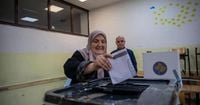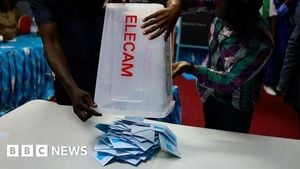Preliminary results from Kosovo’s municipal elections, held on Sunday, October 12, 2025, have cast a spotlight on the country’s persistent political fragmentation and the simmering tensions that continue to define relations between Kosovo and Serbia. According to the Associated Press, most major municipalities—particularly those with ethnic Albanian majorities, including the capital city Pristina—are now headed for runoff votes set for November 9, 2025. This development underscores the challenges Kosovo faces as it seeks both internal unity and greater international engagement.
The numbers tell the story of a divided political landscape. Roughly 2.1 million voters turned out to elect mayors in 38 municipalities and to fill around 1,000 seats in local councils. Yet, preliminary voter turnout was only 40%, a figure notably lower than both the turnout four years ago and the participation seen in parliamentary elections earlier in 2025. The Central Election Commission (CEC) announced that 21 municipalities failed to produce a mayoral candidate with more than 50% of the vote, necessitating a second round of voting in these areas.
In Albanian-majority municipalities, the ruling left-wing Vetëvendosje (Self-Determination) party, led by Prime Minister Albin Kurti, managed to secure just three municipalities. Most of the victories in these regions went to center-right opposition parties, signaling a lack of overwhelming support for the current government and a potential shift in the political winds. This is not just a matter of local governance; it reflects broader dissatisfaction and a desire for political change among Kosovo’s electorate.
Meanwhile, in the Serb-majority municipalities, the results were far more clear-cut. All but one were won by Srpska Lista (Serb List), the dominant Serb political party in Kosovo. Srpska Lista is closely aligned with Serbian President Aleksandar Vučić, a relationship that has long fueled concerns about Serbian influence in Kosovo’s internal affairs. The Associated Press notes that this outcome once again highlights the persistent ethnic and political divides that run through Kosovo’s society.
The elections took place against a backdrop of ongoing political uncertainty in the country. Just two days prior, Kosovo’s Parliament finally ended an eight-month political deadlock by electing its full leadership, including a representative from the ethnic Serb minority. On Saturday, October 11, the acting prime minister was officially tasked with forming a new cabinet within 15 days—a process that is now even more complicated by the inconclusive results of the municipal elections. Major opposition parties have, so far, refused to enter coalition talks, leaving the path forward murky at best.
As Kosovo grapples with these internal challenges, the broader question of its international status remains as contentious as ever. Kosovo declared independence from Serbia in 2008, following a brutal conflict in which around 11,400 people—mostly ethnic Albanians—were killed during the 1998–1999 war. That war ended after a NATO air campaign forced Serbian forces to withdraw, but the scars have not fully healed. While most Western countries recognize Kosovo’s statehood, Serbia does not, and it continues to be backed in this stance by Russia and China. This lack of universal recognition has hampered Kosovo’s efforts to join international organizations and advance its goal of European Union membership.
For many in Kosovo, the outcome of the municipal elections is a sobering reminder of the country’s fractured political landscape and the long road ahead. The ruling Vetëvendosje party’s poor showing—winning only three municipalities—suggests that Prime Minister Kurti’s government may face an uphill battle in forming a stable and effective cabinet. The Associated Press reports that the lack of decisive wins for any party points to a difficult period of negotiation and coalition-building, with no clear end in sight.
At the same time, the dominance of Srpska Lista in Serb-majority municipalities raises questions about the integration of Kosovo’s Serb minority and the extent of Serbian influence in these regions. The party’s close ties to President Vučić are seen by many ethnic Albanians as a challenge to Kosovo’s sovereignty, while Serbs in Kosovo often view Srpska Lista as their only reliable advocate. This dynamic has fueled ongoing mistrust and made meaningful dialogue between the two communities more difficult.
Adding to the complexity is the relatively low voter turnout. With just 40% of eligible voters casting ballots, questions are being raised about the level of public engagement and confidence in the political process. Some analysts suggest that the low turnout reflects widespread frustration with the slow pace of reform and the inability of political leaders to deliver on promises of economic development and European integration.
The local elections also took place at a time when Kosovo urgently needs greater engagement from the European Union. The absence of a new government has been detrimental to the country’s efforts to attract investment, create jobs, and make progress toward EU membership. The European Union has repeatedly called for political stability and dialogue between Kosovo and Serbia, but the current stalemate makes such progress seem elusive.
Looking ahead, all eyes will be on the runoff elections scheduled for November 9. These contests will determine the final makeup of local governments in 21 municipalities and may provide further clues about the direction of Kosovo’s politics. For Prime Minister Kurti and his Vetëvendosje party, the stakes are high: a strong showing in the runoffs could help restore momentum and strengthen their hand in coalition talks, while further losses could embolden the opposition and deepen the current impasse.
For Kosovo’s Serb community, the victories by Srpska Lista are both a source of reassurance and a potential flashpoint. While the party’s success demonstrates its continued relevance, it also underscores the challenges of integrating Serb-majority areas into the broader fabric of Kosovo’s political life. The ongoing tensions between the two communities are likely to persist, particularly as long as the question of Kosovo’s independence remains unresolved.
As the country moves toward the runoff elections, the challenges are clear: building trust between communities, forming a stable government, and advancing Kosovo’s aspirations on the European stage. The road ahead will not be easy, but for many Kosovars, there is hope that a new round of voting and a renewed commitment to dialogue can help move the country forward.




